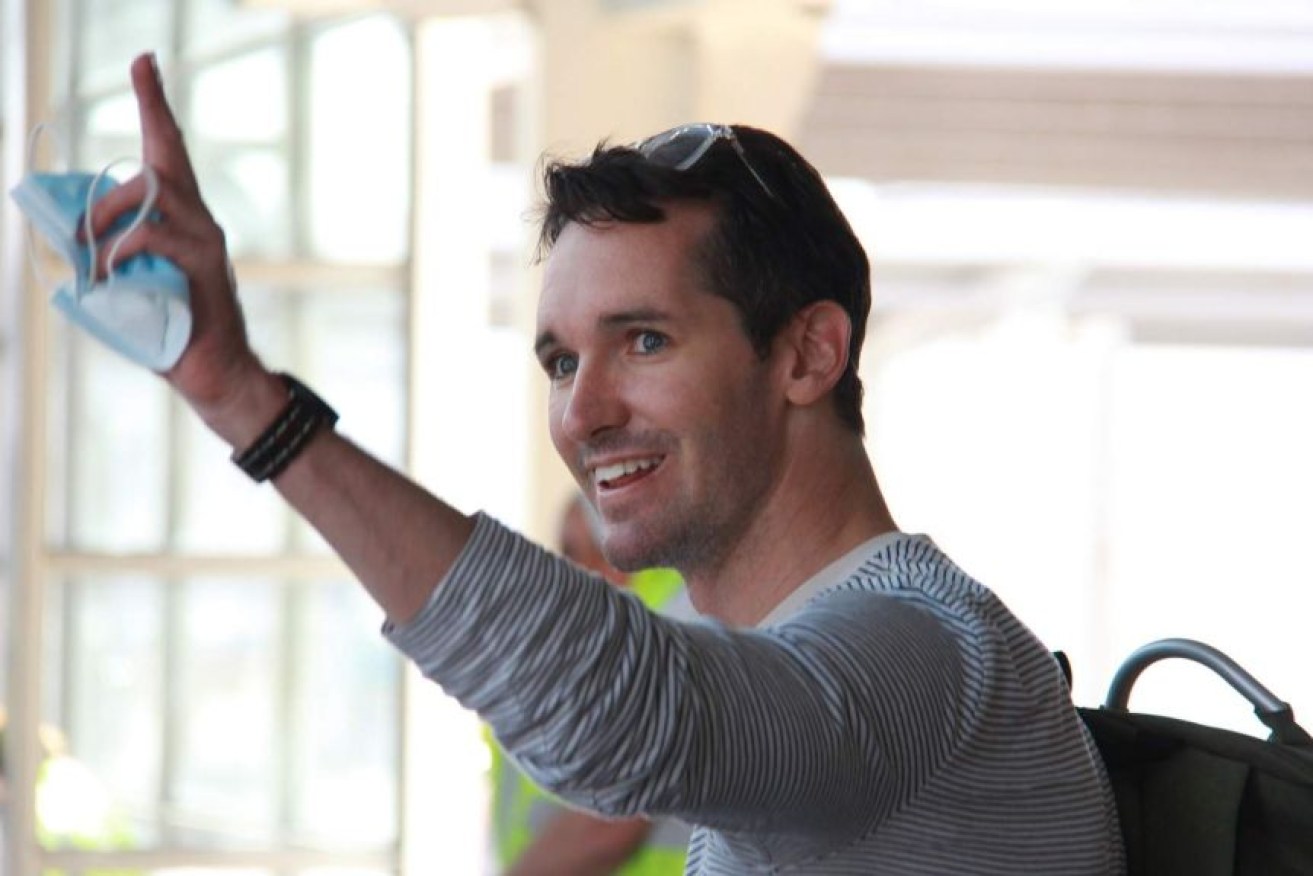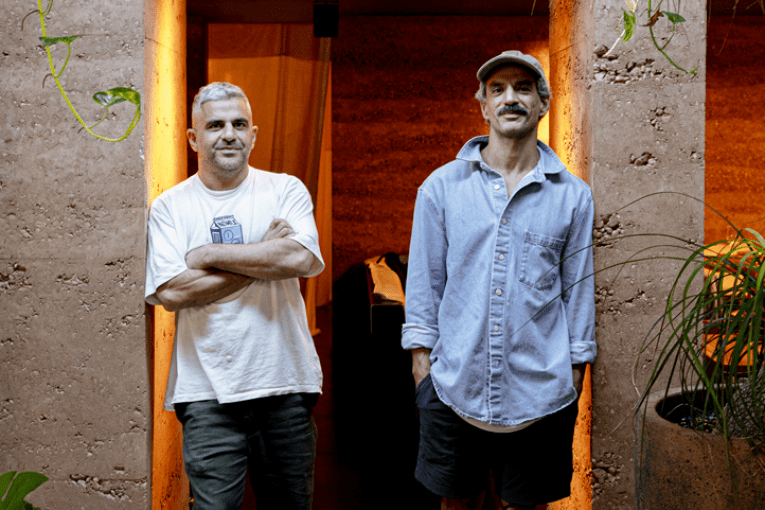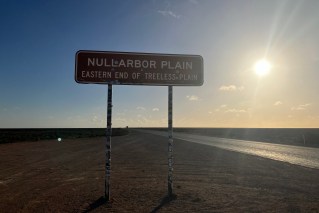The night Chinese State Security came knocking on my apartment door
ABC’s China correspondent Bill Birtles speaks about his ordeal after arriving back in Australia.

Bill Birtles arrived in Australia on Tuesday morning after being rushed home from China. (Photo: ABC News: Taryn Southcombe)
It was Wednesday night and I was starting to get stressed. Very stressed.
There were more than a dozen friends in my Beijing apartment helping me pack up five years’ worth of stuff in the Chinese capital during a short-notice farewell.
But as the hours stretched towards midnight, I felt the juggle between entertaining friends and packing up my life was getting the better of me.
The suitcases remained empty.
The ABC, on advice from the Australian Embassy, had organised for me to be on a morning flight out of Beijing’s capital airport.
I didn’t want to leave. I felt safe and things seemed normal despite the chilling recent news that an Australian anchor for Chinese state media, Cheng Lei, had been detained in a secretive national security case.
I wondered if an abundance of caution was fuelling the advice to get out. But at midnight, there was a knock on the door.
Seven Chinese State Security police officers pay a quick visit
I opened it to see two police officers in standard uniform. At first, I thought maybe they were there because of a noise complaint.
Then, I stuck my head out and saw another five people in plain clothes behind them.
‘Wow,’ I thought, ‘the concerns are real’.
It was quite a scene — my friends had been “helping”‘ finish off my wine supply and had all gathered around the door to tell the police not to take me away. It soon became apparent that wasn’t what they were there for.
Instead, the officers showed me their National Security Department badges, told me I was “involved” in a case and informed me an exit ban had been placed upon me.
They added that I otherwise had “freedom of movement” and that they would ring the following afternoon to organise a chat. And then they left.

Birtles walked around Beijing earlier this year after restrictions imposed due to the coronavirus were lifted. (Photo: News Video)
This was unprecedented. I’ve never heard of a foreign journalist being embroiled in a national security case like this before.
But the doorknock posed more questions than it answered. Why roll up with seven people at midnight if you’re just delivering a message?
Why wait until the following afternoon to talk? Why did they not demand a morning meeting instead?
At least the packing could wait. By the next morning I was heading to the Australian embassy in Beijing to seek advice on what this all meant.
I didn’t know how long I’d be stuck in ‘Hotel Australia’
My mate, Mike Smith from the Australian Financial Review in Shanghai, had received the same late-night visit — clearly a sign this was well-coordinated and planned by China’s State Security Ministry.
The whole situation was pretty murky. But to my surprise, the advice was to stay on the embassy grounds and to refuse the interview request when they ring, citing a lack of safeguards about my safety.
I did this and the person on the other end of the phone seemed to expect it, as though they were reading off a script.
As the high-level negotiations started, I suddenly found myself ensconced in a secure Australian bubble in Beijing. I was able to see and hear the city I had called home for five years, but I wasn’t allowed to venture out.
As the days went by and talks went back and forth, I spent a lot of time pondering how I’d become a pawn in a 4D game of chess.
At times it looked like my visit to “Hotel Australia” might not be a short stay, and I arranged for clothes and supplies to be brought over by friends from my apartment.
But over the weekend the Chinese request to interview me remained a key sticking point. As a result, the focus shifted on how to ensure my safety while I went to meet them.
China’s state security police have form, as journalists know well.

Birtles and Brant Cumming were put in quarantine in their homes after reporting on coronavirus in South Korea earlier this year. (Photo: Supplied: Bill Birtles)
Secretive detentions, a lack of access to lawyers and vague, drawn-out legal processes have defined multiple national security cases involving foreigners in recent years.
There was no way I wanted to be made to sign anything that was false or would be used to incriminate others.
I was told there was no 100 per cent way to ensure the meeting wasn’t a ruse to detain me.
But some of the sharpest Australian minds with experience of dealing with China had formed the view that Beijing was, at least for arrangements for the interview, acting in good faith.
An interview with China’s police inside a hotel room
It was my decision, I was told. But it was far from certain how China’s position might change if news broke of the diplomatic tussle going on in two cities.

Birtles arrived in Australia on Tuesday morning after being rushed home from China. (Photo: ABC News: Taryn Southcombe)
Journalistic curiosity partly drove me, but I also thought if they really wanted to escalate diplomatic tensions and detain an Australian media journalist, they would have done so that night at the front door.
So, I agreed. Clearly, I wasn’t going back to my normal life in Beijing either way.
The following day there was no update until late in the afternoon — clearly a sense of urgency from the Chinese side was lacking.
Eventually they arranged for a night-time interview at a mid-range hotel in Sanlitun — a buzzing nightlife district not far from my apartment.
I wasn’t going there alone — there were arrangements in place — but the police wouldn’t permit anyone else I was with to go beyond the lobby.
When I arrived, I was taken upstairs to level 22 where several men manning the floor pointed me to a room.
Inside were three police officers, a translator and a video camera pointed at the couch where I was to sit.
A bottle of wine and some crackers sat on the mini bar nearby in what was otherwise a normal hotel room.
The main officer was the same older cop who knocked on my door at midnight and told me in a thick Beijing accent that we want to “have a discussion”.
The questioning started with the basics — my name, my job — before I was asked how long I had been a reporter in China.
It turned mildly comical when he followed up by asking if any of my stories were related to China. I told him they all were, and he asked me to cite some of the more “important topics”.
I was then asked if I’d reported on the Hong Kong National Security Law and what “channels” I went through to get my information.

Birtles went to cover the Hong Kong protests last year. (Photo: ABC News)
But it was very superficial stuff — there was never any real effort to dig deeper and find out who my sources were.
Interviewer cracked jokes at times
Then the interview turned to the case which I’m supposedly involved in — the national security investigation of Ms Cheng.
She is someone I know, but not particularly well. I certainly wouldn’t be the first person you would interrogate about her.
I suggested to the interrogators that this discussion was related to the Australia-China relationship, and I was asked my opinion on the current state of ties.
As the interview neared its end, I was becoming increasingly at ease.
The older Beijing officer seemed to enjoy continuously rejecting my questions about the politics of the interrogation and lecturing me about China being a “rule-of-law country”.
He even cracked a few jokes as a colleague typed up a transcript of the interview.
It was presented to me, all in Chinese, and I went through it meticulously to ensure I wouldn’t be signing something that falsely represented my words.
It was an accurate, if slightly condensed account, of our discussion and I had to sign it. They rejected my request for a copy, citing legal reasons.
I returned to the lobby and was later taken back to the embassy feeling relatively secure, but flat.
After my discussions, I felt confident I would be allowed to leave China the next day as promised despite the last-minute hitch with the exit ban.

The Australian Financial Review’s Michael Smith (left) and the ABC’s Bill Birtles at Shanghai Airport on Monday..(Supplied)
I was able to transit in Shanghai and unite with Smith for a final meal at the terminal and a long flight home.
What it feels like to leave the city I called home
After five years of reporting for the ABC in Beijing and seven years in the city in total, I felt nothing but deep disappointment and sadness that it was ending this way.
Sadness that I had to so quickly bid farewell to my extraordinary colleagues in the bureau, who regularly put up with tough conditions and don’t have another country to head to if things get dicey.
Sadness that I was being rushed out because I had become a pawn in a much bigger diplomatic stoush.
But I’m hardly alone. Earlier this year, two of the best Australian journalists in China — Chris Buckley of The New York Times and Phillip Wen of the Wall Street Journal — were forced out, as were many of their American colleagues.
Chinese state media reporters have also been made to leave the US as relations soured.
My departure is just part of a bigger trend accelerated by Beijing’s increasing pursuit of a narrative exclusively on the Communist Party’s terms.
It is a pursuit that will leave both Australians, Chinese and the wider world less informed and less understanding of each other.
– ABC / Bill Birtles












